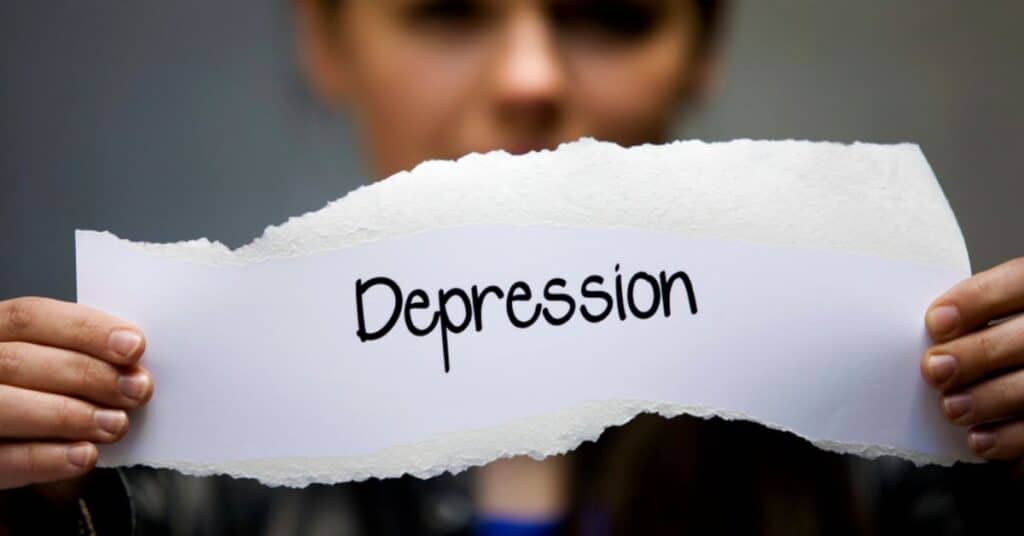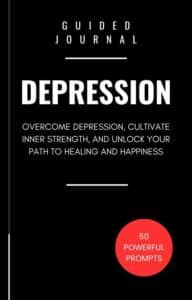In the depths of depression, the mind becomes a labyrinth of swirling emotions, tangled thoughts, and overwhelming darkness. It’s a place where hope seems to wither away, where the weight of the world crushes the spirit, and where silence becomes a haunting companion.
Depression can be a lonely and isolating journey, but within the darkness lies the potential for profound self-discovery and healing. Journaling offers a safe haven for exploring the depths of depression, providing a space to navigate the labyrinth, confront the shadows, and find moments of clarity and solace.
In this article, we present 50 thought-provoking journal prompts that will guide you on a transformative journey of self-reflection, encouraging you to delve into the depths of your emotions, confront your fears, and ultimately find a glimmer of light amidst the darkness.
Understanding Depression: Shedding Light on a Common Mental Health Condition
Depression affects millions of individuals worldwide, and by delving into its definition, symptoms, and impact, we hope to foster empathy, awareness, and support for those dealing with this challenging condition.
Defining Depression
Depression is a complex and multifaceted mental health disorder characterized by persistent feelings of sadness, hopelessness, and a lack of interest or pleasure in activities. It goes beyond ordinary feelings of sadness and lasts for an extended period, often significantly impacting the individual’s ability to function in daily life.
Symptoms of Depression
Emotional Symptoms:
- Overwhelming sadness or a constant feeling of emptiness.
- Pervasive feelings of guilt, worthlessness, or self-blame.
- Loss of interest in activities once enjoyed.
- Irritability, restlessness, or excessive crying.
- Difficulty concentrating, making decisions, or remembering details.
Physical Symptoms:
- Persistent fatigue or low energy levels.
- Sleep disturbances, such as insomnia or excessive sleeping.
- Changes in appetite, leading to weight loss or gain.
- Unexplained aches, pains, or headaches.
- Digestive issues, such as stomachaches or digestive problems.
Behavioral Symptoms:
- Social withdrawal and isolation from loved ones.
- Decreased productivity, struggling at work or school.
- Increased reliance on substances like alcohol or drugs.
- Self-harming behaviors or thoughts of suicide.
Understanding the Impact
Depression affects individuals differently, but it can have a profound impact on various aspects of life:
Relationships: Depression can strain relationships due to withdrawal, emotional numbness, and difficulty engaging in social activities.
Work or School: Concentration difficulties, decreased productivity, and absenteeism can arise, hindering success and professional growth.
Physical Health: Depression has been linked to increased risk of physical health issues like heart disease, obesity, and chronic pain.
Self-Esteem: A sense of hopelessness and self-doubt can erode self-esteem, making it challenging to seek help and break the cycle of depression.
Relatable Examples
Sarah, a college student, used to enjoy spending time with friends and pursuing her hobbies. However, for the past few months, she has lost interest in these activities, constantly feeling empty and exhausted. She struggles with concentration and often finds herself tearful for no apparent reason.
John, a hardworking professional, has noticed a sharp decline in his productivity at work. He feels overwhelmed, experiences unexplained physical pain, and has trouble sleeping. His once-active social life has come to a standstill as he withdraws from friends and family.
By providing a comprehensive definition, exploring the symptoms, and highlighting the impact of depression, we hope to foster understanding and empathy. It is crucial to recognize depression as a legitimate illness and offer support and resources to those who may be struggling. Remember, seeking professional help, opening up about your feelings, and providing support to others can make a significant difference in combating depression and promoting mental well-being.

The Transformative Power of Journaling: Overcoming Depression One Word at a Time
Are you tired of feeling trapped in the darkness of depression? Do you long for a way to express your thoughts and emotions, to create a path towards healing and self-discovery? Look no further than journaling – a simple yet profound practice that can transform your life from within.
In this chapter, we will explore the true essence of journaling and delve into its transformative benefits specifically for depression. Get ready to embark on a journey of self-reflection, growth, and renewed hope.
Understanding Journaling: An Expression of Your Inner World
Journaling is a deeply personal practice that involves regularly recording your thoughts, feelings, and experiences in a journal or diary. It provides a safe and non-judgmental space for you to explore your innermost thoughts, dreams, fears, and aspirations. By putting pen to paper, you can externalize your internal struggles and gain a fresh perspective on your emotions.
The Therapeutic Power of Journaling for Depression
Emotional Release: Depression often leaves you feeling overwhelmed by a storm of negative emotions. Journaling acts as a cathartic release, allowing you to unload your burdens onto the pages of your journal. By giving voice to your pain, you can experience a sense of relief and liberation.
Self-Reflection and Awareness: Through journaling, you develop a deeper understanding of your thoughts and emotions. It provides an opportunity to identify patterns, triggers, and negative thought cycles associated with your depression. By gaining insight into your inner world, you can take proactive steps towards healing.
Clarifying Your Feelings: Depression can often make your emotions feel muddled and confusing. Journaling helps you untangle these emotions, giving them structure and clarity. By articulating your feelings, you can regain a sense of control and develop healthier coping mechanisms.
Identifying Triggers and Patterns: Journaling allows you to track your mood, energy levels, and daily experiences. This enables you to identify triggers that exacerbate your depression and recognize patterns that contribute to your emotional well-being. Armed with this self-knowledge, you can make informed decisions to improve your mental health.
Positive Affirmations and Gratitude: Journaling is not just about exploring the negative aspects of depression but also cultivating positivity. By incorporating positive affirmations and gratitude exercises into your journaling practice, you can rewire your brain to focus on the good, fostering a more optimistic mindset.
How to Start Journaling for Depression: A Step-by-Step Guide
Create a Safe Space: Find a quiet and comfortable space where you can be alone with your thoughts. Gather your favorite journal, pens, and any other materials that inspire you.
Set a Regular Routine: Establish a consistent journaling routine to make it a habit. Whether it’s in the morning or at night, find a time that works best for you. Aim to write for at least 10-15 minutes each day.
Let Your Words Flow: Remember, there are no rules or judgments in journaling. Write freely and authentically, allowing your thoughts to flow without censorship. Don’t worry about grammar or style – this is for your eyes only.
Explore Different Techniques: Experiment with different journaling techniques such as freewriting, prompts, lists, or even doodling. Find what resonates with you and helps you express yourself most effectively.
Reflect and Review: Take time to read your entries periodically. Reflect on your progress, insights, and challenges. Celebrate your victories and learn from your setbacks. Use your journal as a tool for growth and self-reflection.
Journaling holds the power to transform your journey with depression. It provides a gateway to self-discovery, emotional healing, and personal growth. By engaging in this transformative practice, you can find solace in your own words, gain clarity amidst the chaos, and ultimately embark on a path towards a brighter tomorrow.
So, grab a pen, open your heart, and let the transformative power of journaling guide you towards a life filled with hope, resilience, and self-empowerment. Your story awaits.

Journal Writing Prompts for Depression
Imagine depression as a physical entity. What does it look like? How does it feel?
Write a letter to your depression, expressing your deepest emotions and frustrations.
If depression had a color, what color would it be? Describe why.
Reflect on a time when you felt the weight of depression lift even for a brief moment. What caused that shift?
Write a dialogue between your depressed self and your optimistic self. What do they say to each other?
How does depression affect your daily life? Describe the challenges it presents.
Explore the metaphorical landscapes of your depression. What does it look like? What elements are present?
Write a poem capturing the essence of your depression.
Describe a song or piece of music that resonates with your experience of depression. What emotions does it evoke?
Imagine you are sitting in a room with your depression. What does the room look like? How does it feel?
Write about a small moment of joy or relief you’ve experienced in the midst of depression.
Reflect on the ways in which depression has changed your perspective on life.
Explore the connection between depression and creativity. How does depression affect your creative process?
Write a list of things that make you feel even the tiniest bit better when you’re feeling depressed.
Imagine you could step outside of your depression for a day. How would you spend that day?
Describe a dream or a nightmare you’ve had that reflects your experience with depression.
Write about the role that self-compassion plays in managing your depression.
Reflect on the ways in which depression has affected your relationships. How have they changed?
If depression were a weather condition, what would it be? How does it impact your emotional climate?
Write a letter to a loved one, explaining what it’s like to live with depression.
Explore the connection between depression and personal identity. How does depression shape who you are?
Describe a place that makes you feel safe and protected from the weight of depression.
Reflect on the lessons you have learned from your experiences with depression.
Write about a coping mechanism that has helped you navigate through depressive episodes.
Imagine your depression as a character in a story. How does it interact with the other characters?
Describe a memory from your childhood that is closely tied to your experience of depression.
Reflect on the ways in which depression has influenced your perception of time.
Write a dialogue between your present self and your future self, discussing your journey with depression.
Explore the relationship between depression and self-esteem. How does one impact the other?
Describe a fictional world where depression is the norm. How does that world function?
Reflect on the ways in which depression has altered your relationship with yourself.
Write a letter to your younger self, offering guidance and support through their struggles with depression.
Explore the role that nature and the outdoors play in your battle against depression.
Describe a moment when someone’s understanding or support made a difference in your experience of depression.
Reflect on the ways in which depression has influenced your perception of beauty.
Write a list of affirmations or mantras that help you cope with depressive thoughts.
Explore the connection between depression and self-expression. How does depression impact your ability to communicate?
Describe a fictional character who embodies the essence of depression. What traits do they possess?
Reflect on the ways in which depression has changed your relationship with hope.
Write about a small act of kindness that brought some light into your dark moments of depression.
Explore the connection between depression and physical health. How are they intertwined?
Describe a day in your life where depression had a particularly strong presence. What did that day look like?
Reflect on the ways in which depression has affected your motivation and productivity.
Write a letter to your future self, envisioning a life free from the grip of depression.
Explore the connection between depression and dreams. How do they intertwine?
Describe a work of art that captures the essence of depression. What elements stand out to you?
Reflect on the ways in which depression has affected your ability to trust others.
Write about a time when you found solace and comfort in the midst of your depression.
Explore the connection between depression and self-care. How does taking care of yourself impact your mental state?
Describe a symbol or object that represents your journey with depression. What does it signify?
Download Printable Journal Prompts (PDF) >>
Guided Journal for Depression
50 Powerful Prompts to Overcome Depression, Cultivate Inner Strength, and Unlock Your Path to Healing and Happiness

Are you tired of living under the weight of depression? Do you long for a way to break free from the darkness and find your path to healing and happiness? Introducing the Guided Journal for Depression, a transformative tool designed to help you navigate the challenging journey of depression and reclaim your life. Through a unique blend of self-reflection, guidance, and empowerment, this journal offers a powerful solution to those struggling with depression.
The Guided Journal for Depression: Your Personal Pathway to Healing:
- Discover a structured and supportive journaling experience that guides you through your healing journey.
- Experience the therapeutic power of self-reflection, as you uncover the root causes and triggers of your depression.
- Cultivate self-awareness and self-compassion through 50 carefully crafted prompts.
Tired of merely surviving each day? It’s time to thrive and reclaim your life. The Guided Journal for Depression offers you a lifeline, guiding you through the darkest moments with empathy, understanding, and a roadmap to healing. Embrace the power of self-reflection, and empowerment as you embark on this transformative journey. Say goodbye to the grip of depression and hello to a life filled with joy, purpose, and resilience.
Don’t wait any longer—start your journey towards healing today with the Guided Journal for Depression.
As you embark on this journey of self-exploration through journaling, remember that you are not alone.
Depression may be a formidable adversary, but your words have the power to illuminate even the darkest corners of your mind. Each journal prompt is an invitation to dig deeper, to confront your pain, and to embrace your vulnerability. It is through this process that healing can begin to take root.
So, take your pen in hand and let the ink flow freely. Allow yourself to be unfiltered, unapologetic, and wholly authentic. And as you reach the final pages of your journal, remember to celebrate the progress you’ve made, the insights you’ve gained, and the strength you’ve discovered within yourself.
The journey of self-discovery continues, and with each word you write, you pave the way for a brighter future. Now, as you close your journal and take a moment to reflect, ask yourself this: What will you do with the lessons learned from your journey through the depths of depression?

